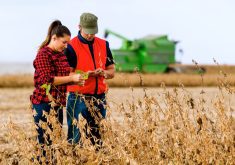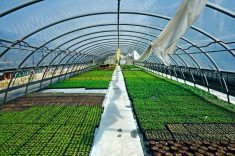“Watch what you eat. Wherever possible, avoid food grown with pesticides, in feedlots, or by agribusiness. It’s an easy way to use your dollars to vote against the spread of toxins in our bodies, soil and water.”
This is the fourth principle in the consumption manifesto issued by the World Watch Institute, an environmental research organization based in Washington, D.C. It is one of 10 principles that include staying close to home and forgoing travel because “internal combustion engines are polluting, expensive to put on the road and maintain… their use should be minimized. Period.” (Tell that to the Saskatchewan farm partner who needs a $6,000 part and is driving three hours to beat a raincloud!) Most of it is common sense but there appears to be a desire to find fault with large agriculture and agribusiness.
Read Also

Farm equipment sales sector sees significant structural changes
Farming equipment sales have been declining for a number of years now, and one industry professional believes structural changes in the industry are needed to curb that trend.
And in cases like this, arguing is a waste of energy. The statement reminds me of my presentation to several animal rights and environmental activists a few years ago. After being called a murderer when I walked into the room (thus confirming I was in the right place), it would have been easy to be offended and go on the defensive. Instead, I acknowledged the other speakers and encouraged them to continue to dialogue. I then went on to talk about the evolution of the use of food animal and the value of the “fifth quarter.”
Food animals may have started as fur and then leather, and after man learned to cook there was a shift to meat. After several thousand years, we have only in the last century discovered the other multiple uses of food animal. From the new arteries in Grandpa’s heart to the shoes on your feet, food animal contributes to our well-being and our high standard of living. The products make us lovely, clean, comfortable and connected. Chicken feathers go in computer manufacturing, tallow in my yogurt, ear hairs in my paintbrush, and blood is used in research efforts that will aid future generations.
Agribusiness turns byproducts into “something” that we value and have come to depend on. To take out food animal and the additional processing would be at a high societal cost.
To ask someone to change their mind about a feedlot would be fruitless but to introduce them to this concept of the “fifth quarter” may give them a new perspective. And that is a win-win situation.
We tried this with a cattle feeder case study. A producer I’ll call Casey has a family owned feedlot and a state-of-the-art traceability program. Treated animals do not go into the food chain. From an animal welfare perspective all is well. One day a reporter drives by while Casey is vaccinating incoming calves. She films this from the road with a long lens and the headline reads “Factory farm loads animals with antibiotics.” It went on to say that we are poisoned by the factory farm and then poisoned again by the agribusiness that processes them. In other words, a total buy-in of the fourth World Watch consumption principle.
More from the Alberta Farmer Express website: How to answer those tough agricultural questions from your urban neighbours
Casey’s first reaction was outright anger and it took a while to think it through. In this situation, Casey came up with a nice closed-end statement that could not be taken out of context. He said he was “ensuring the health and wellness of his cattle through appropriate and approved vaccination protocols.” When asked how he would respond to further pressure, he concluded that a brush-off would be detrimental so he laid out an invitation by saying “if there are no further questions I would like to get back to ensuring the outmost well-being of the animals entrusted to my care.”
This is not to say that food animal production is without fault or can’t be improved. Of course, urban animal ownership is also not without problems and horrible offences to companion animals do not occur. At all times, we must be learning how to prevent disease and discomfort of our food animals. This is the business we are in. Telling the story is the start of a new level of dialogue.
And what of Casey and his feedyard? He went on to be the “local” guy who reporters could go to for straight-up facts about food animal production in his area and he engaged a friend to talk about a balanced diet and the nutritional benefits of a meat-inclusive meal.
More importantly, he learned a new level of discipline and how not to be combative. Never again did he take the manifestos of organizations such as the World Watch Institute lightly. But he did engage with the public, driving them around the farm in his truck with the big engine, leaning into the wind laced with the sweet scent of manure and treating them to the delicious end product that was processed at the local agribusiness.















